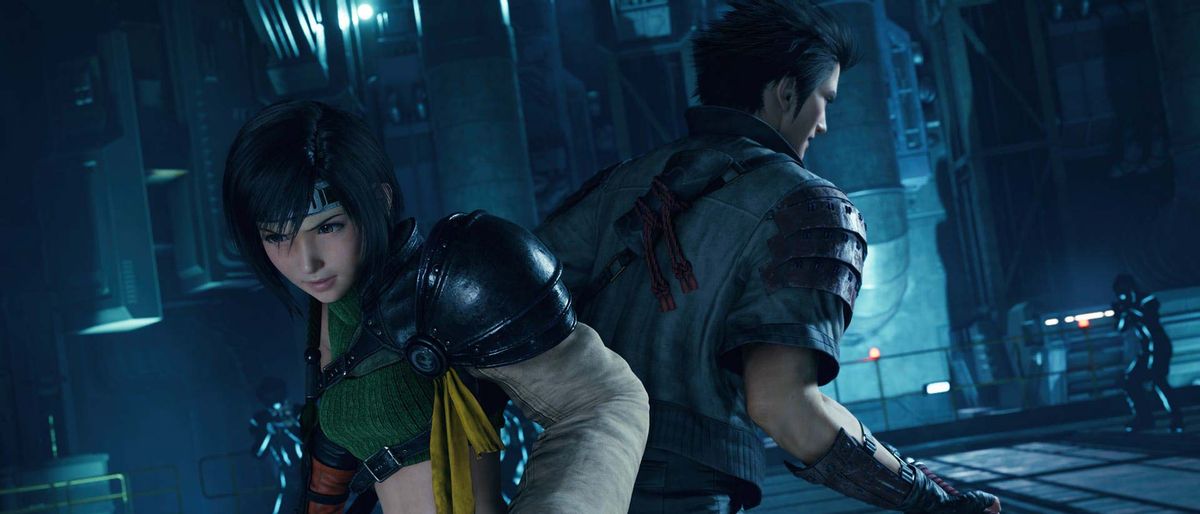Tom's Guide Verdict
Final Fantasy 7 Remake Intergrade leverages the PS5 to make a great game even better, but it’s the Intermission DLC where the experience really shines.
Pros
- +
Yuffie chapters are a blast to play
- +
Interesting new story developments
- +
Solid graphical and performance improvements
- +
Free(ish) upgrade for PS4 players
Cons
- -
Load times can still be a pain
- -
New chapters are expensive
Why you can trust Tom's Guide
Editor's Note: Square Enix has announced Final Fantasy VII Rebirth, which will pick up where Final Fantasy VII Remake Intergrade left off.
Before we dive into our Final Fantasy 7 Remake Intergrade review, we should probably explain what it is. When Final Fantasy 7 Remake debuted last year, it quickly became one of the best PS4 games you could buy. It also quickly became one of the most demanding PS4 games you could buy, pushing the aging system to its limits.
Enter Final Fantasy 7 Remake Intergrade: a dedicated PS5 upgrade for the game, including better graphics, faster frame rates, shorter load times and a whole new DLC adventure with a fan-favorite character. If you already own the PS4 version, you can upgrade for free — mostly.
For the most part, Final Fantasy 7 Remake Intergrade is as straightforward as it sounds, transforming a late-era PS4 game into a much smoother early-era PS5 game. The Final Fantasy 7 Remake Intermission chapters are well worth playing, and fan-favorite party member Yuffie Kisaragi makes a worthwhile addition to the FF7R canon.
If you already own the PS4 version, the Yuffie chapters are a little short to merit their $20 asking price, and the Intergrade experience is otherwise almost identical to what you’ve already played. The DualSense upgrades feel mild, and the load times can still be obnoxious. On the whole, though, if you have a PS5 and want to either revisit FF7R or play it for the first time, Intergrade is the way to go.
Final Fantasy 7 Remake Intergrade review: How to upgrade
There are two ways to get Final Fantasy 7 Remake Intergrade, and which one you use will depend on whether you bought the game on PS4. At this juncture, it’s also worth distinguishing between Final Fantasy 7 Remake Intergrade, and Final Fantasy 7 Remake Episode Intermission. (Square Enix has a thing for giving games very confusing names.)
Final Fantasy 7 Remake Intergrade refers to the entirety of the experience on PS5. That includes both the upgraded game, as well as the Episode Intermission DLC. The Intermission DLC pack includes two new game chapters and lets you play through a side story as Yuffie Kisaragi: a party member from the original Final Fantasy 7.
If you already own Final Fantasy 7 Intergrade on PS4, you can download a free PS5 upgrade on the PlayStation Store. However, if you want the Final Fantasy 7 Remake Episode Intermission, it costs an additional $20.
If you don’t own the PS4 version, Final Fantasy 7 Remake Intergrade costs $70 to buy on the PS5, and it includes the Intermission DLC. There are also various Deluxe editions and add-ons, but those are the basics.
Final Fantasy 7 Remake Intergrade review: Episode Intermission
The bulk of the Final Fantasy 7 Remake Intergrade upgrades are cosmetic. The one big exception is the Final Fantasy 7 Remake Episode Intermission DLC. This highly anticipated package adds two new chapters to the game, in which you play as Materia-hunting ninja Yuffie Kisaragi.

Longtime fans may remember Yuffie as an optional party member from the original Final Fantasy 7. Here, she gets fully fleshed out as a three-dimensional character, complete with strengths, weaknesses, a goofy sense of humor and the beginnings of a character arc. She also gets a new party member: Sonon Kusakabe, an original creation for FF7R Intergrade.

For the most part, gameplay is identical to that in FF7R: chaotic, occasionally difficult real-time battles, where you’ll frequently pause to select special abilities. Yuffie has a slew of new abilities tied to her shuriken weaponry. She can attack melee or ranged; she can “sync” her attacks with Sonon’s to more effectively pressure individual enemies; she can change the elemental affinity of her blows; she can even conjure up a brand-new summon spell (Ramuh, for longtime series fans).


The only real drawback here is that Sonon is your only party member throughout the experience. That means the battles aren’t quite as tactically rich as those in the base game, which let you build a three-person party from four possible members.

In terms of story, FF7R Intergrade also goes to some very strange and agreeable places. In this short side story, Yuffie infiltrates the cyberpunk city of Midgar to steal the “ultimate” Materia from greedy megacorporation Shinra. This is already something we never saw in the original FF7. But, as in FF7R last year, the story goes to some bizarre places by the end, bringing in some very unexpected characters from deep in the series mythos. It’s a rewarding move for longtime fans, although newcomers may be left scratching their heads.
It’s also worth mentioning the Fort Condor side quest, which reimagines the original FF7’s real-time strategy missions as a popular board game. Fort Condor is a surprisingly deep and robust addition to FF7R, complete with lots of units to collect and lots of strategies to deploy against your foes. It’s a relatively short side quest, though, and you’ll run out of opponents just as you’re starting to get a handle on some deeper strategies.

My only big issue with Episode Intermission is that if you’re upgrading from the PS4 version, there may not be quite enough content here to justify $20. The two chapters will run you about 5 hours. After that, you can replay the DLC in Hard mode, or take on a few additional combat challenges, but some of these battles feel downright masochistic. If you just want to play through Yuffie’s story once on Normal (or Easy), $20 is a high asking price.
Final Fantasy 7 Remake Intergrade review: PS5 additions
Like many PS5 games, Final Fantasy 7 Remake Intergrade asks you to choose between a “Graphics Mode” that prioritizes resolution, and a “Performance Mode” that tries to keep the frame rate at 60 frames per second. Both modes work well, and the lighting in particular is much more nuanced than what we saw on the PS4.


There are also two new difficulty options available: Easy (Classic) and Normal (Classic). Your characters automatically use basic attacks in these modes, letting you focus on managing your party’s special attacks. They’re not strategically deep enough for experienced players, but they could prove useful for newcomers.
Square Enix also played up Intergrade’s DualSense features and loading times. However, these still don’t feel as seamless as they could. The DualSense has more subtle vibrations than the DualShock 4, but the vast majority of effects are still just various degrees of vibrations whenever a character attacks or defends. Loading times are much better than before, but there are still some tricks to hide them, including ladders, poles, conveyor belts and so forth. Resetting some of the side activities can still be a time-consuming process.
Final Fantasy 7 Remake Intergrade review: Verdict
Depending on what you want, Final Fantasy 7 Remake Intergrade could be free; it could cost $20; it could cost $70. But whichever version you need, you’ll probably get your money’s worth. The Episode Intermission chapters, while short, are well worth a playthrough, and the graphical enhancements to the base game are as gorgeous as promised.
Either way, it’s reassuring to know that Square Enix is still hard at work on new Final Fantasy 7 Remake content. At this rate, we may just get the next full installment before the PS5 gives way to the PS6.
Marshall Honorof is a senior editor for Tom's Guide, overseeing the site's coverage of gaming hardware and software. He comes from a science writing background, having studied paleomammalogy, biological anthropology, and the history of science and technology. After hours, you can find him practicing taekwondo or doing deep dives on classic sci-fi.
